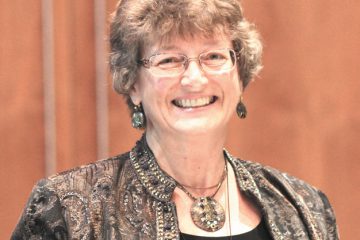Character lessons
A final thought in the Look at the Holy Book Series
With Candace R. Kwiatek, The Jewish Family Identity Forum, The Dayton Jewish Observer

I went to serve coffee to guests recently and discovered that much to my chagrin, I had forgotten to put in the filter before brewing. You can imagine the mess. There are just a few simple rules for using a coffee maker: put in a filter, fill the coffee and water, and plug it in. Ignoring any one of those basic steps means a less-than-satisfactory result.
The coffee incident unexpectedly reminded me of an opinion piece in The Denver Post that noted many top universities in the United States no longer require their English majors to take a course on Shakespeare, including Yale, NYU, Penn State, and OSU (Shakespeare, the missing man on campus). That’s like trying to make coffee without a filter.
Learning, like coffee-making, starts with a few simple rules, the most important of which is “begin with core subjects.” Not doing so has led to the abysmal illiteracy of college grads, documented in the American Council of Trustees and Alumni study, What Will They Learn?
Of course, coffee making can go way beyond the basics, as parodied in a Starbucks order of “triple venti sugar free, non fat, no foam, caramel drizzle under and over the whipped cream, caramel macchiato, extra hot, double cupped.”
Higher education also exhibits extreme offerings, such as Street Fighting Mathematics (MIT), Arguing with Judge Judy – Popular Logic (UC Berkeley), and Conservation and Captive Management of Raptors (Cornell). But for most popular coffee shops and successful colleges, the main menu starts with the basics.
So what can coffee and college teach us about engaging with the Bible? Too often, we approach scripture as if it were designed only for the Starbucks extremist: those fluent in the vocabulary, familiar with the details, and capable of meaningfully combining multiple elements. Or, like many universities’ attitudes toward a core curriculum, we view the Bible as an archaic legalistic code, outdated by relevancy and modern sensibilities.
Both approaches keep us from seriously engaging with the most interesting, relevant, and universally influential wisdom literature ever written.
If we want to satisfactorily engage with the Bible, like coffee and college we need to begin with the basics, the coffee beans and core courses. There are 12: a pair and a Decalogue.
The most basic lesson about how to approach the Bible is found in the universally familiar response by Hillel. When asked to summarize the Torah while standing on one foot, he responded, “That which is despicable to you, do not do to your fellow. This is the whole Torah; all the rest is commentary. Go and learn it (BT Shabbat 31a).” This is not “Do unto others,” a kind of quid pro quo approach to relationships, but a simple admonition to do no harm or unkindness to others.
This is the ethical foundation, the simple rule upon which all the biblical stories and laws of interpersonal relations are built. Rather than getting caught up in the details, this is one of two core values we should seek in the text.
This ethical foundation of interpersonal relationships is balanced by a second core value, the divine foundation of personal character implicit in the challenge, “You shall be holy, for I the Lord your God am holy (Lev. 19:2).”
In other words, we must elevate our own personal character, not just our interactions with others. We must improve our individual selves as fervently as we improve the world.
Qualities such as humility, honor, enthusiasm, gratitude, and integrity, encouraged by the biblical stories and ritual laws, are the foundation of holiness.
This is the other half of the Torah, I would say to Hillel, but just the same, “all the rest is commentary. Go and learn it.”
Without this pair — the interpersonal and the intrapersonal, the ethical and the holy — the biblical text seems to suggest, we cannot be fully human.
What about the other 10 coffee beans and core courses or basics of the Bible, the Decalogue? According to tradition, the Ten Commandments (or better, declarations) function as categories for all the commandments in the Bible. Thus, they too can be understood as biblical basics.
The Decalogue begins by outlining what it means to be holy: recognize the Divine, the source of liberty; do not worship earthly gods (neither idols nor gods like power, wealth or fame); do not take God’s name in vain (through false oaths and promises or by belittling God in public); remember and keep holy the Sabbath (and sacred times, separating them from the secular); and honor parents (as well as other adults and teachers who act as God’s emissaries in the world).
The remaining five highlight the key elements of ethics: do not murder (physical or emotional harm, such as embarrassing or degrading in public); do not commit adultery (sexual immorality); do not steal (including the theft of physical or intellectual property, unethical business practices, and kidnapping); do not bear false witness (perjury and all sins of speech, lashon hora); and do not covet (wanting that which belongs to your neighbor to the point of conspiring how to get it for yourself).
Together, the tablets of the Decalogue reflect the core principles of holiness and ethics.
What can we learn about character from coffee and college? To develop a character of value, like excellent coffee or a worthwhile college education, it must be built on a foundation of value, one based on a few simple rules or basic principles. The rest is just commentary. Now go and study.
Family Discussion: There are 5,888 verses in the Torah (Kiddushin 30a), working out to about 100 verses per week. If the Torah is largely commentary, as Hillel suggests, which basics — the pair or the Decalogue — are reflected in this week’s biblical reading?
Literature to share
The Ten Commandments: How Our Most Ancient Moral Text Can Renew Modern Life by David Hazony. What do the commandments really mean? How do they address the universal human fallibilities and provide the core of moral wisdom? And what was so revolutionary about their ideas? Written for the layperson, this volume combines scholarship with practical application and is worth rereading every year in this season.
The Littlest Mountain by Barb Rosenstock. The rabbinic tale from the Talmud (Bereshit 99:1) about how Mt. Sinai was chosen for the giving of the Torah is brought to life by the dialogue and lively watercolor illustrations in this simple picture book. A natural for dramatizing by young children, it is the perfect story for Shavuot and a must-have for the family bookshelf.
To read the complete June 2014 Dayton Jewish Observer, click here.



